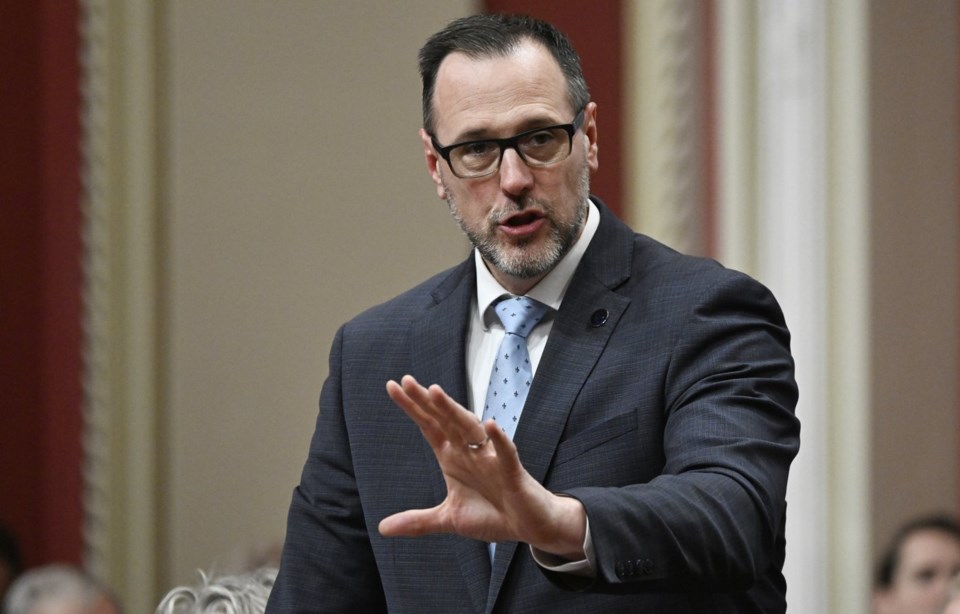MONTREAL — The Quebec government says it is planning to ban prayer in public places as part of a move to strengthen secularism in the province.
The announcement makes good on an idea first mentioned last winter by Premier François Legault, who said he didn't want to see people praying in public parks or on streets.
On Thursday, Secularism Minister Jean-François Roberge confirmed he will table legislation this fall to outlaw the practice. The move comes amid simmering tension in Quebec over Muslim prayers taking place as part of pro-Palestinian demonstrations, including in front of the Notre-Dame Basilica of Montreal.
"The rise of street prayers is a serious and sensitive issue in Quebec," Roberge said in a written statement. "Last December, our government expressed its unease with this growing phenomenon, particularly in Montreal."
Roberge did not say whether the government would invoke the notwithstanding clause, which would allow the bill to override certain sections of the Canadian Charter of Rights and Freedoms. Last year, Legault said he was considering that possibility.
"Seeing people on their knees in the streets, praying, I think we have to ask ourselves the question. I don't think it's something we should see," he said at the time.
In an interview Thursday, National Council of Canadian Muslims CEO Stephen Brown said protest tactics like Muslim prayers in front of the Basilica may be unwise in Quebec's current political climate – but they should not be banned. "Why is it the only time when the government feels that there's a problem is when all of a sudden you see Muslims praying in the streets?" he said.
The Centre for Israel and Jewish Affairs, meanwhile, said it has been urging the government for months to take action against prayers that block public spaces.
The legislation would be one part of a larger push by the province's Coalition Avenir Québec government to expand secularism rules. Another bill tabled in the spring would extend the province's workplace ban on religious symbols to all public school staff.
"Facing serious difficulties in the polls, the Legault government is desperately trying to regain points in public opinion by exploiting a profitable theme: fear of Muslims," said former Canadian senator André Pratte on the social media platform X.
"Let's be clear here: it's not prayers in public places that are disturbing. ... No, what's disturbing is Muslims who pray, in the same way that the ban on religious symbols really only targeted the Muslim head scarf."
Earlier this week, an independent committee made 50 recommendations to the government on how to strengthen secularism. In a nearly 300-page report, the committee suggested limiting religious accommodations and extending the religious symbols ban to daycare workers.
The committee, headed by two lawyers, also looked at the question of public prayer, but stopped short of recommending a blanket ban. Instead, the report said it should be up to municipalities to regulate the practice.
The authors said they tried to strike a balance between upholding Quebec's collective values and "the preservation of religious practices that do not unduly harm public order."
On Thursday, the Canadian Civil Liberties Association condemned the Quebec government's plan, calling it an "alarming measure" that would be a "clear infringement" on freedom of religion and assembly.
But Legault's party is not alone in considering a ban on public prayer. Parti Québécois Leader Paul St-Pierre Plamondon on Thursday announced he would hold a "consultative referendum" for members to weigh in on what his party's position should be. He called public prayers an "appropriation of public space by religious fundamentalists."
Martin Laliberté, president of the assembly of Catholic bishops of Quebec, said a ban on public prayer could disrupt Catholic rituals like the Way of the Cross procession on Good Friday. He questioned whether it would be illegal for someone to practice yoga in a park, or to pray during a visit by the Pope.
"That's what it would mean if it were taken to the extreme," he said. "We're heading into a very dangerous area for the government, I think."
This report by The Canadian Press was first published Aug. 28, 2025.
— With files from Thomas Laberge in Quebec City
Maura Forrest, The Canadian Press



